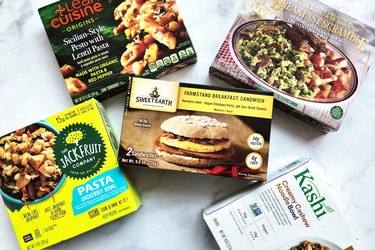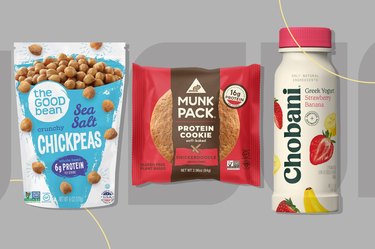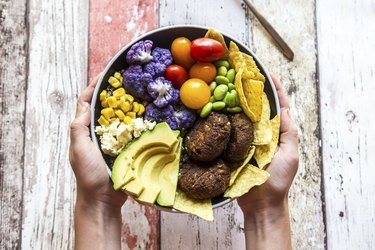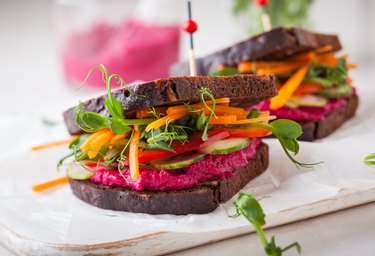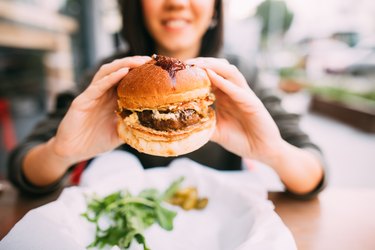
Meat-free patties from plant-based companies like Impossible Foods and Beyond Meat seem to be everywhere: Burger King, TGI Fridays, Dunkin' and even your local sports arena probably carry a version. But how do they stack up with the real deal?
While these plant-forward patties are animal-free, they're also processed. Homemade veggie burgers often call for whole-food ingredients like beans, quinoa and, yes, actual vegetables. However, the processed burgers made by these brands exist in another category altogether.
Video of the Day
Video of the Day
To learn more about the popular meat-free products on the market, we unpacked what's really inside modern plant-based burgers and spoke to experts to figure out whether options like the Beyond Burger and the Impossible Burger are actually good for you.
What's In Plant-Based Burgers?
The Impossible and Beyond burgers promise plant-based ingredients, plenty of protein and a convincing meaty flavor. That may sound like a tall order, but both brands have created mock meat products that seriously taste like the real thing — thanks, in large part, to innovative formulations created by brand scientists (more on that later).
If you're a die-hard omnivore, you might be thinking: Will a soy- or pea-based burger really satisfy me as much as a traditional hamburger? Research suggests it just might.
A small study found high-protein diets made of either animal protein or soy protein had similar effects on appetite control and weight loss in people with obesity, per August 2014 research in The American Journal of Clinical Nutrition.
Of course, unlike a traditional hamburger, these plant-based patties tend to contain a host of ingredients the average consumer can't quite decode. Let's take a closer look.
Impossible Burger Ingredients
The primary ingredient that lends the Impossible Burger its meaty profile is heme, an iron-containing molecule that naturally exists primarily in animals. Impossible Burger formulated its own lab-made, plant-based heme by fermenting soybeans, which contain something called soy leghemoglobin. Here's what this popular meat alternative is made out of:
- Soy protein concentrate: This protein is derived from soybeans by removing fat and carbs from the legumes.
- Coconut oil: Oil extracted from coconuts.
- Sunflower oil: Oil that is pressed from sunflower seeds. "It contains both mono- and polyunsaturated fats, vitamin E, and, thanks to the phytosterols, it can help lower cholesterol levels," registered dietitian-nutritionist Frances Largeman-Roth, RDN tells LIVESTRONG.com. One downside: "Some studies have shown that when sunflower oil is used in high-heat cooking, such as frying, it releases aldehydes, which are hazardous when inhaled."
- Methylcellulose: "Methylcellulose is synthetically derived from cellulose, the most abundant plant fiber," says New York-based food scientist Laura Katz, a former professor of food science and technology at New York University. "It is commonly used as a thickening agent and a gelling agent."
- Yeast extract: Yeast extract, which is formed when the enzymes in yeast cells dissolve proteins, acts as a flavor enhancer.
- Cultured dextrose: "Cultured dextrose is made by fermenting dextrose, which is glucose derived from corn, using bacteria that are typically found in dairy," Katz says. "It acts as an antimicrobial agent in foods."
- Modified food starch: Starch that is usually derived from corn, wheat, potato or tapioca. It's commonly used in foods as a texture-stabilizing agent, thickener or anti-caking agent.
- Soy leghemoglobin: Short for legume hemoglobin, this plant-derived oxygen carrier is similar to hemoglobin. "Just like hemoglobin, it has a distinct red color and is approved by the FDA to be used as a coloring agent in foods," Katz says. "When the burger is heated, the leghemoglobin releases heme, producing a 'bleeding' effect."
- Soy protein isolate: This protein is derived from peas by removing fat and carbs from the legumes. "It's highly refined and more than 90 percent protein," Katz says. "Soy protein isolate is commonly used for its moisture retention properties and its ability to bind with fat."
Beyond Burger Ingredients
Unlike the Impossible Burger, the Beyond Burger is soy-free. Here's a rundown of what's inside the product:
- Pea protein: This protein is derived from peas by removing fat and carbs from the legumes. "Pea protein isolate may have better emulsifying properties than soy protein isolate," Katz says. People with severe allergies to legumes (think: peanuts) should be careful when consuming pea protein. Peas are also legumes and thus have the potential to cause an allergic reaction in certain individuals.
- Avocado oil: Heart-healthy oil extracted from the fruit of avocados.
- Rice and lentil proteins: This protein is derived from rice and lentils by removing carbs and other components.
- Natural flavors: Basically a catchall term for flavors derived from natural sources. While not synthetic, they can still undergo processing.
- Bean protein: This protein is derived from various beans by removing fat and carbs from the beans.
- Methylcellulose: A chemical compound derived from cellulose, a main structural component of plant cells. It is used as a thickener and gelling agent in food products.
- Pea and potato starch: This starch is extracted from peas and potatoes and consists of long chains of glucose.
- Potassium salt: A mineral salt that can be used as a replacement for table salt.
Nutrition Facts
Despite the differences in their ingredient lists, the plant-based burgers are quite similar in nutritional value to a beef burger in terms of calories, protein and saturated fat, says Sharon Palmer, RDN and author of The Plant-Powered Diet.
One Impossible Burger patty contains:
- 230 calories
- 13 grams of fat (6 grams of saturated fat)
- 370 milligrams of sodium
- 9 grams of carbs (5 grams of fiber, <1 gram of sugar)
- 19 grams of protein
One Beyond Burger patty contains:
- 230 calories
- 14 grams of fat (2 grams of saturated fat)
- 310 milligrams of sodium
- 8 grams of carbs (2 grams of fiber, 0 grams of sugar)
- 21 grams of protein
One patty made from 85 percent lean beef :
- 192 calories
- 12 grams of fat (4.5 grams of saturated fat)
- 55 milligrams of sodium
- 0 grams of carbs
- 20 grams of protein
Some key differences: Whereas the Impossible Burger and Beyond Burger both contain fiber, a beef burger does not. All three, however, provide saturated fat, which has been linked to adverse health outcomes like increased "bad" LDL cholesterol and weight gain, according to the U.S. National Library of Medicine.
The Beyond Burger and Impossible Burger each contain more sodium than a beef burger, which isn't all that surprising. Store-bought veggie burgers are often high in salt. Keep in mind, though, that these veggie-based patties are higher in sodium because they are already seasoned, Palmer says. If you salt your beef burger, as pretty much anyone would, it would likely serve up a similar amount of sodium.
"The total recommended sodium intake per day is 2,300 milligrams," Largeman-Roth adds. "If a burger is your main meal, along with a salad or possibly fries, then a sodium intake of no more than 450 milligrams or so [per burger] is reasonable." Of course, adding pickles, cheese and condiments to any type of burger can push this number up.
Tip
To keep your salt intake in check, prepare your own patty at home, where you can control how much salt is added to the dish. If you’re buying meatless burgers at the supermarket, Palmer suggests opting for those that provide less than 20 percent of your Daily Value (denoted as DV on nutrition labels) of sodium per serving.
Should You Go for a Plant-Based Burger?
There's no question about it: A well-planned, plant-based diet trumps the standard American diet (aptly abbreviated to SAD) when it comes to your overall health.
In fact, sticking to a lacto-ovo vegetarian diet (aka one that includes eggs and dairy) helped reduce people's LDL cholesterol levels even more significantly than a Mediterranean diet did, according to a March 2018 study in Circulation.
What's more, a review of 96 studies found following a vegetarian diet was linked to a 25 percent lower risk of dying from heart disease. A vegan diet was associated with a 15 percent reduced risk of cancer incidence, in the November 2017 research in Critical Reviews in Food Science and Nutrition.
Plain and simple: "Science shows that you can reduce your risks of chronic diseases with a plant-based diet, and also significantly cut your eco-footprint," Palmer says. After all, livestock production accounts for 14.5 percent of all anthropogenic, or human-generated, greenhouse gas emissions, according to The Food and Agriculture Organization of the United Nations.
In terms of the safety of the processed ingredients in meatless burgers like those made by Beyond Meat and Impossible Foods, there is still plenty more research to be done. However, little evidence currently exists to suggest that processed ingredients like soy protein isolate, for example, can compromise your health in the long term.
In fact, soy protein isolate is linked to regulating hormones and even lower risk of breast cancer, heart disease and osteoporosis, according to the National Institutes of Health.
While some worry that the isoflavones in soy protein isolate, specifically, can raise cancer risk, The American Institute for Cancer Research maintains that soy protein isolate, as well as textured soy protein, don't contain more isoflavones than an equal serving of roasted soybeans.
Warning
One word of caution: If you have a personal or family history of certain cancers or thyroid issues, avoid taking soy or isoflavone supplements because the supplements may contain higher levels of isoflavones, according to the Mayo Clinic.
Are Meat Alternatives Ultra-Processed Foods?
If you're not eating a food in its whole, natural form — like an apple — chances are its been processed in some way. Processed food is not inherently unhealthy. But ultra- or highly processed foods are considered less healthy than minimally processed foods, according to the Cleveland Clinic.
Processed plant-based burgers made to taste like meat typically contain many ingredients. Still, Palmer doesn't consider the Beyond Burger or the Impossible Burger to be "ultra-processed" products.
Ultra-processed foods are those that have been modified significantly (usually via industrial techniques) and contain added sugars, oils, fats, flavors and preservatives. They're typically convenient and highly palatable.
"While some of the characteristics of [the Impossible and Beyond] burgers seem to fit in here, they do provide important nutrients, like protein and fiber, and are a big step above ultra-processed foods, like sodas and chips," notes Palmer.
Beef also undergoes multiple stages of processing, including cleaning, grinding, and combining. Of course, unlike their plant-based peers, beef burgers also serve up dietary cholesterol and contribute significantly to environmental damage.
While Palmer does not consider the new plant-based burgers to be ultra-processed, she does think they "probably are more processed" than a traditional beef burger when you consider how many ingredients they contain and the extent to which those ingredients have been manipulated. "It's not something you or I could make at home with ingredients we can buy at a grocery store," Largeman-Roth says.
Even so, choosing meatless burgers over a beef patty may be the way to go: "Their ingredients are not linked to the same negative health and environmental consequences that beef is linked to," Palmer says. "Many studies have found that beef has a very high environmental footprint and that high red meat intake is linked with health risks."
The Bottom Line
If you're craving a burger (of any kind), go ahead and enjoy it once in a while! "There's definitely a place for both 'real' and plant-based burgers," Largeman-Roth says. "Both should be eaten occasionally — but not as the main component of your diet."
The best choice of all? Make your own veggie burgers at home using nutrient-dense ingredients like beans, lentils, whole grains, veggies, herbs, seeds and nuts, Palmer says. Doing so allows you to control the sodium content of the dish and add your favorite flavors to the dish. No chemistry degree required.
- The American Journal of Clinical Nutrition: “Appetite Control and Biomarkers of Satiety With Vegetarian (Soy) and Meat-Based High-Protein Diets for Weight Loss in Obese Men: a Randomized Crossover Trial”
- American Heart Association: “Why Should I Limit My Sodium?”
- U.S. National Library of Medicine: “Facts About Saturated Fats”
- National Institutes of Health: “Soy Protein Isolate”
- Circulation: “Low-Calorie Vegetarian Versus Mediterranean Diets for Reducing Body Weight and Improving Cardiovascular Risk Profile”
- Critical Reviews in Food Science & Nutrition: “Vegetarian, Vegan Diets and Multiple Health Outcomes: a Systematic Review With Meta-Analysis of Observational Studies”
- American Cancer Research Institute: "Soy and Breast Cancer: Myths and Misconceptions"
- Mayo Clinic: “Will Eating Soy Increase My Risk of Breast Cancer?”
- USDA National Nutrient Database: "Beef, ground, 85% lean meat / 15% fat, patty, cooked, broiled"
- FAO: "Livestock solutions for climate change"
- Cleveland Clinic: "What Ultra-Processed Foods Are (and Why They’re So Bad for You)"
